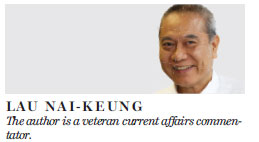Singles Day is a mark of the mainland's rising soft power
Updated: 2015-11-17 07:50
By Lau Nai-keung(HK Edition)
|
|||||||||
Quite a few Hong Kong people set their alarm clocks to go off at midnight on Nov 11 - a day which is known on the mainland as Singles Day - so they will not miss the bargains offered in limited numbers online.
While more Hong Kong companies are facing difficulties on the mainland, an increasing number of Hong Kong people are participating in the mainland shopping festival - a fact which has made many "localists" uneasy.
Singles Day started on the mainland as a university sub-cultural event with young singles celebrating their "singleness" informally and playfully on Nov 11. They chose this day, the 11th day of the 11th month, because the four 1s signal singleness. Singles Day soon spread among the youth population. Although Nov 11 is not an official holiday, young singles organize gatherings in the evening to have fun and meet new friends.
In 2009, China's e-commerce giant Alibaba rebranded Singles Day as an online shopping festival (also known as the "Double 11" festival). Alibaba encouraged retailers on its online e-commerce platforms, Taobao and Tmall, to join the event and promote online shopping by offering consumers discounts of at least 50 percent. This, therefore, makes a historically slow retail season exciting.
During last year's Singles Day, transactions on Alibaba's platforms totaled 57.1 billion yuan ($8.96 billion). This year, Alibaba surpassed itself again by boosting the transaction amount to 91.2 billion yuan. This figure is spectacular, but the growth is even more impressive.
Until last year, the Singles Day shopping festival had been limited largely to the mainland. Starting in 2014, the Alibaba Group launched many initiatives to make Singles Day "global", and the efforts are beginning to bear fruit.
Awareness of this shopping festival has increased among Hong Kong people. Many of them have started to participate in the festival, not least because Taobao launched a special platform for shoppers in Hong Kong, Taiwan, Singapore and Malaysia, promising fast and reliable delivery.
Singles Day has also gained a foothold in Taiwan. Leading e-shopping websites on the island, including Yahoo, Rakuten and GOMAJI, also offered shoppers huge discounts on Nov 11, emulating the mainland's shopping binge on platforms such as Taobao and JD. Many purchases were made on the originating sites of the shopping festival and on other mainland e-commerce platforms - so much so that Taiwan customs had to set up a special squad to cope with the increase in imported goods from the mainland during and after Singles Day.
Despite all the concerns over fakes and defective products, Tmall and Taobao have slowly but gradually captured the hearts and minds of Hong Kong people. As SAR people get to experience the conveniences offered by Baidu, Alibaba, Tencent and other mainland startups, they realize how innovative these companies can be. The more introspective ones will begin to realize that these companies did not become successful only by chance. There are many other contributing factors, such as sound government policies and support, education and the resulting talents, a conducive capital market environment and so on.
Alibaba represents the new face of the mainland's soft power. It is the most effective propaganda machine. Our "localists" think the majority of Hong Kong people will renounce any connections with the mainland. But in reality most of us not only consume food imported mainly from the mainland, but also watch its television, listen to its singers, play its online games and shop on its e-commerce sites.
Both the SAR government and the central government should therefore actively encourage mainland companies to bring their best products and services to Hong Kong. This is also in line with our country's stated goal to take mainland companies "global": If companies from the mainland cannot even do well in Hong Kong, how can they compete in other industrialized markets?

(HK Edition 11/17/2015 page9)